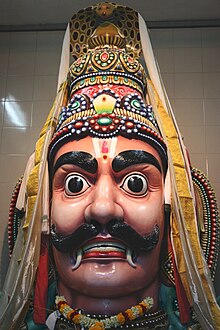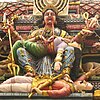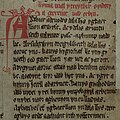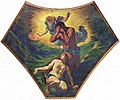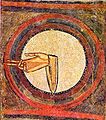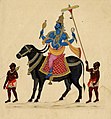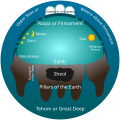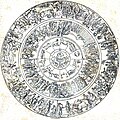Our website is made possible by displaying online advertisements to our visitors.
Please consider supporting us by disabling your ad blocker.
Portal:Myths
The Myths Portal


Myth is a genre of folklore consisting primarily of narratives that play a fundamental role in a society. For scholars, this is very different from the vernacular usage of the term "myth" that refers to a belief that is not true. Instead, the veracity of a myth is not a defining criterion.
Myths are often endorsed by secular and religious authorities and are closely linked to religion or spirituality. Many societies group their myths, legends, and history together, considering myths and legends to be factual accounts of their remote past. In particular, creation myths take place in a primordial age when the world had not achieved its later form. Origin myths explain how a society's customs, institutions, and taboos were established and sanctified. National myths are narratives about a nation's past that symbolize the nation's values. There is a complex relationship between recital of myths and the enactment of rituals. (Full article...)
Selected article -
Iravan also known as Iravat and Iravant, is a minor character from the Hindu epic Mahabharata. The son of Pandava prince Arjuna (one of the main heroes of the Mahabharata) and the Naga princess Ulupi, Iravan is the central deity of the cult of Kuttantavar (Kuttandavar) which is also the name commonly given to him in that tradition—and plays a major role in the sect of Draupadi. Both these sects are of Tamil origin, from a region of the country where he is worshipped as a village deity and is known as Aravan. He is also a patron god of well-known transgender communities called Alis (also Aravani in Tamil, and Hijra throughout South Asia).
The Mahabharata portrays Iravan as dying a heroic death on the 8th day of the 18-day Kurukshetra War (Mahabharata war), the epic's main subject. However, the South Indian traditions have a supplementary practice of honouring Aravan's self-sacrifice to the goddess Kali to ensure her favour and the victory of the Pandavas in the war. The Kuttantavar tradition focuses on one of the three boons granted to Aravan by the god Krishna in honour of this self-sacrifice. Aravan requested that he be married before his death. Krishna satisfied this boon in his female form, Mohini. In Koovagam, Tamil Nadu, this incident is re-enacted in an 18-day festival, first by a ceremonial marriage of Aravan to Alis (hijra) and male villagers (who have taken vows to Aravan) and then by their widowhood after ritual re-enactment of Aravan's sacrifice. (Full article...)
Did you know? -
- ... that Tamil Hindu parents dedicate their one-month-old children to the goddess Periyachi (pictured), who is depicted ripping a woman's womb?
- ... that according to Hindu mythology, the "first king" Prithu chased the Earth in the form of a cow (pictured), who eventually agreed to yield her milk as all the world's grain and vegetation?
- ...that according to Inca mythology, lunar eclipses are caused by animals attacking Mama Quilla, the goddess of the moon?
- ... that the worshippers of Xipe Totec (pictured), the Aztec god of renewal, wore the flayed skins of their sacrificial victims?
Recognised content
Featured Articles:
![]() Ahalya,
Ahalya, ![]() Ancient Egyptian literature,
Ancient Egyptian literature, ![]() King Arthur,
King Arthur, ![]() Ganesha,
Ganesha, ![]() Iravan,
Iravan, ![]() Orion (mythology),
Orion (mythology), ![]() Vampire,
Vampire, ![]() Vithoba
Vithoba
Featured Lists:
![]() List of valkyrie names in Norse mythology
List of valkyrie names in Norse mythology
Good Articles:
![]() 2012 phenomenon,
2012 phenomenon,
![]() Æsir–Vanir War,
Æsir–Vanir War,
![]() Ala (demon),
Ala (demon),
![]() Anu,
Anu,
![]() Aphrodite,
Aphrodite,
![]() Athena,
Athena,
![]() Ardhanarishvara,
Ardhanarishvara,
![]() Battle of Barry,
Battle of Barry,
![]() Bhikshatana,
Bhikshatana,
![]() Catalogue of Women,
Catalogue of Women,
![]() Chamunda,
Chamunda,
![]() Chhinnamasta,
Chhinnamasta,
![]() Consorts of Ganesha,
Consorts of Ganesha,
![]() Cú Chulainn,
Cú Chulainn,
![]() Dhumavati,
Dhumavati,
![]() Dumuzid,
Dumuzid,
![]() Einherjar,
Einherjar,
![]() Eir,
Eir,
![]() Enlil,
Enlil,
![]() Fairy Flag,
Fairy Flag,
![]() Fenrir,
Fenrir,
![]() Gerðr,
Gerðr,
![]() Hel (being),
Hel (being),
![]() Huginn and Muninn,
Huginn and Muninn,
![]() Iðunn,
Iðunn,
![]() Ila (Hinduism),
Ila (Hinduism),
![]() Inanna,
Inanna,
![]() Kabandha,
Kabandha,
![]() Kali,
Kali,
![]() Kamadhenu,
Kamadhenu,
![]() Kangiten,
Kangiten,
![]() Keshi (demon),
Keshi (demon),
![]() Khandoba,
Khandoba,
![]() Kratos (mythology)
Kratos (mythology)
![]() Krishna,
Krishna,
![]() Kubera,
Kubera,
![]() LGBT themes in Hindu mythology,
LGBT themes in Hindu mythology,
![]() Manasa,
Manasa,
![]() Mandodari,
Mandodari,
![]() Matangi,
Matangi,
![]() Matrikas,
Matrikas,
![]() Maya Sita,
Maya Sita,
![]() Mohini,
Mohini,
![]() Myrrha,
Myrrha,
![]() Mythology of Carnivàle,
Mythology of Carnivàle,
![]() Naraka (Hinduism),
Naraka (Hinduism),
![]() Ninurta,
Ninurta,
![]() Prester John,
Prester John,
![]() Prithu,
Prithu,
![]() Putana,
Putana,
![]() Rati,
Rati,
![]() Ratatoskr,
Ratatoskr,
![]() Revanta,
Revanta,
![]() Satyavati,
Satyavati,
![]() Satyr,
Satyr,
![]() Sharabha,
Sharabha,
![]() Shashthi,
Shashthi,
![]() Shiva,
Shiva,
![]() Sif,
Sif,
![]() Tara (Ramayana),
Tara (Ramayana),
![]() Troilus,
Troilus,
![]() Tuisto,
Tuisto,
![]() Valhalla,
Valhalla,
![]() Valkyrie,
Valkyrie,
![]() Vampire folklore by region,
Vampire folklore by region,
![]() Varaha,
Varaha,
![]() Varahi,
Varahi,
![]() Veðrfölnir and eagle
Veðrfölnir and eagle
![]() Zduhać
Zduhać
Wikiversity
Selected creature -

Fenrir (Old Norse 'fen-dweller') or Fenrisúlfr (Old Norse "Fenrir's wolf", often translated "Fenris-wolf"), also referred to as Hróðvitnir (Old Norse "fame-wolf") and Vánagandr (Old Norse 'monster of the [River] Ván'), is a monstrous wolf in Norse mythology. In Old Norse texts, Fenrir plays a key role during the events of Ragnarök, where he is foretold to assist in setting the world aflame, resulting in the collapse of humanity and society, and killing the god Odin.
Fenrir, along with Hel and Jörmungandr, is a child of Loki and female jötunn Angrboða. He is attested in the Poetic Edda, compiled in the 13th century from earlier traditional sources, and the Prose Edda and Heimskringla, composed in the 13th century. In both the Poetic Edda and Prose Edda, Fenrir is the father of the wolves Sköll and Hati Hróðvitnisson, is a son of Loki and is foretold to kill the god Odin during the events of Ragnarök, but will in turn be killed by Odin's son Víðarr. (Full article...)
General images
Subcategories
WikiProjects
Things you can do
- Help with the myth and folklore missing articles project.
- Help create requested articles.
- Help assessment at Wikipedia:WikiProject Mythology/Assessment.
- Place the project banner {{WikiProject Mythology}} on the talk pages of all relevant articles.
- Check the recent changes for recent improvements, vandalism, and other changes.
- Answer requests for mythology articles needing attention: Category:Mythology articles needing attention
- Answer requests for mythology articles needing expert attention: Category:Mythology articles needing expert attention
- Expand articles tagged as mythology stubs: Category:Mythology stubs
- Assist mythology subprojects.
- Add requested photographs of mythology subjects: Category:Wikipedia requested photographs of mythology subjects
Associated Wikimedia
The following Wikimedia Foundation sister projects provide more on this subject:
-
Commons
Free media repository -
Wikibooks
Free textbooks and manuals -
Wikidata
Free knowledge base -
Wikinews
Free-content news -
Wikiquote
Collection of quotations -
Wikisource
Free-content library -
Wikiversity
Free learning tools -
Wiktionary
Dictionary and thesaurus
Previous Page Next Page

